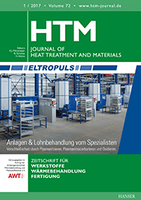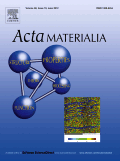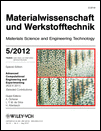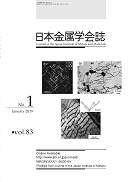
PHYSICS OF METALS AND METALLOGRAPHY
Scope & Guideline
Diving Deep into the World of Metals and Alloys
Introduction
Aims and Scopes
- Metallic Structures and Microstructures:
The journal emphasizes the study of microstructural features in metals and alloys, including phase transformations, grain boundaries, and the effects of processing on structural integrity. - Mechanical and Physical Properties of Metals:
Research on the mechanical properties such as strength, ductility, hardness, and fatigue resistance of various metallic materials is a core focus, often linked to microstructural changes. - Advanced Material Processing Techniques:
The journal covers innovative methods in material processing, including additive manufacturing, welding, and thermomechanical treatments, aimed at enhancing material performance. - Magnetic and Electrical Properties:
Studies on the magnetic, electrical, and thermal properties of metals and alloys, including investigations into magnetocaloric effects and electronic structures, are significant themes. - Nanostructured and Composite Materials:
Research on nanostructured materials and composites, including their synthesis, characterization, and potential applications, is increasingly featured, reflecting the trend towards advanced materials.
Trending and Emerging
- Additive Manufacturing and 3D Printing of Metals:
There is a notable increase in research related to additive manufacturing techniques, particularly focusing on the properties and applications of 3D-printed metallic components. - Nanomaterials and Nanostructured Alloys:
The study of nanostructured materials, including their synthesis, characterization, and novel properties, has gained significant attention, reflecting a broader trend in materials science. - Magnetocaloric Materials:
Research on magnetocaloric materials and their applications in refrigeration and energy conversion technologies is emerging as a key focus area. - High-Entropy Alloys:
The exploration of high-entropy alloys and their unique properties is increasingly prevalent, indicating a shift towards more complex and versatile materials. - Computational Materials Science:
The integration of computational methods and modeling in materials research is on the rise, facilitating a deeper understanding of structure-property relationships in metals.
Declining or Waning
- Hydrogen Effects on Metals:
Research related to the interaction of hydrogen with metals, which was more prominent in earlier years, appears to be less frequently addressed in recent publications. - Corrosion Studies:
While corrosion remains an important aspect of materials science, specific studies focusing on traditional corrosion mechanisms in metals have decreased, possibly due to a shift towards more innovative protective strategies. - Basic Thermodynamics of Alloys:
Basic studies on the thermodynamic properties of alloys, which were once common, are now less frequently published, suggesting a move towards more application-focused research. - Traditional Ferrous Alloys:
Research specifically focused on conventional ferrous alloys and their properties is declining, as interest shifts towards more advanced and high-performance materials. - Classical Material Testing Methods:
The reliance on classical mechanical testing methods has waned in favor of more sophisticated and interdisciplinary approaches that integrate computational techniques.
Similar Journals

JOURNAL OF CERAMIC PROCESSING RESEARCH
Advancing the Frontiers of Ceramic InnovationJOURNAL OF CERAMIC PROCESSING RESEARCH, published by the Korean Association for Crystal Growth, Inc., serves as a vital source of scholarly communication in the field of ceramics and composites. With an ISSN of 1229-9162, this well-regarded journal aims to advance knowledge through rigorous research and publication of innovative studies that push the boundaries of ceramic processing technologies. Indexed in Scopus and boasting a 2023 Q3 ranking in the ceramics category, it provides a platform for researchers to disseminate their findings and engage with emerging trends in material science. The journal reflects a commitment to contributing to the scientific community, emphasizing the importance of interdisciplinary collaboration and advancements in fabrication techniques. Although it operates under a traditional access model, the journal is a beacon for researchers, professionals, and students, inviting them to explore breakthroughs from the years 2000 through 2024 and beyond.

HTM-Journal of Heat Treatment and Materials
Elevating the discourse in heat treatment and materials engineering.HTM-Journal of Heat Treatment and Materials, published by WALTER DE GRUYTER GMBH, serves as a vital platform for the dissemination of research in the fields of Industrial and Manufacturing Engineering, Materials Chemistry, and Metals and Alloys. With an ISSN of 1867-2493 and an E-ISSN of 2194-1831, this peer-reviewed journal focuses on the advancements and methodologies associated with heat treatment processes, materials innovation, and their applications across various industries. Notably recognized in the Q3 category for Industrial and Manufacturing Engineering and Materials Chemistry, as well as Q2 for Metals and Alloys, the journal has garnered significant attention, illustrated by its Scopus rankings, placing it among the scholarly discussions within the field. Although it operates under a closed access model, the journal remains committed to impactful research that influences both academia and industry, ensuring its relevance and importance in shaping future developments in materials science. It is an essential resource for researchers, professionals, and students striving to stay at the forefront of heat treatment and materials research.

Metallography Microstructure and Analysis
Illuminating the Microstructural World of MetalsWelcome to Metallography Microstructure and Analysis, a prominent journal dedicated to the exploration of microstructural properties and their implications in metallic materials. Published by SpringerNature, this journal stands at the forefront of research in the field of materials science, particularly focusing on metals and alloys. With an impressive Q2 ranking in 2023 within its category and a Scopus rank of #72 out of 176, it continues to provide significant contributions to the understanding of metallography, attracting diverse readership among researchers, industry professionals, and students alike. The journal spans a converged period from 2012 to 2024, ensuring it captures the evolving landscape of metallurgical studies. Although it does not currently offer open access, this platform is essential for disseminating high-quality, peer-reviewed research that fosters innovation and development in metallurgical practices.

ACTA MATERIALIA
Pioneering Discoveries in Ceramics, Metals, and PolymersACTA MATERIALIA is a premier journal in the field of materials science, published by PERGAMON-ELSEVIER SCIENCE LTD. With an ISSN of 1359-6454 and an E-ISSN of 1873-2453, this esteemed journal serves as a vital platform for disseminating high-quality research across various critical domains, including ceramics and composites, electronic, optical and magnetic materials, metals and alloys, and polymers and plastics. Recognized for its impact in the field, ACTA MATERIALIA boasts a remarkable standing, featuring a Q1 ranking in multiple categories as of 2023, solidifying its importance among the top journals in materials science. Researchers and professionals benefit from open access options, ensuring that groundbreaking findings are available to a global audience. Operating out of the United Kingdom, ACTA MATERIALIA strives to advance knowledge and innovation within the materials science community, making it an invaluable resource for academics, industrial professionals, and students dedicated to the future of material engineering and technology.

MATERIALWISSENSCHAFT UND WERKSTOFFTECHNIK
Advancing Knowledge in Material Engineering.MATERIALWISSENSCHAFT UND WERKSTOFFTECHNIK, published by WILEY-V C H VERLAG GMBH, is a prominent journal dedicated to the field of materials science and engineering. With its ISSN 0933-5137 and E-ISSN 1521-4052, this journal serves as a vital resource for researchers and professionals engaged in exploring the intricate relationships between the properties of materials and their applications. Established in 1970 and continuing through 2024, the journal has been consistently recognized in various categories, achieving a Q3 ranking in 2023 across Condensed Matter Physics, Materials Science (miscellaneous), Mechanical Engineering, and Mechanics of Materials. Although it does not offer open access, its high-quality peer-reviewed content is fundamental to the advancement of knowledge within its three key areas: novel material development, material characterization, and application of materials in engineering contexts. As a driving force in the scientific community, MATERIALWISSENSCHAFT UND WERKSTOFFTECHNIK continues to cater to the curiosity of aspiring students, seasoned professionals, and researchers alike, facilitating a deeper understanding of the complexities of material technology.

KOVOVE MATERIALY-METALLIC MATERIALS
Unveiling the Mechanics of MetalsKOVOVE MATERIALY-METALLIC MATERIALS, published by REDAKCIA KOVOVE MATERIALY, is a prominent journal embedded within the field of materials science, focusing particularly on metallic materials. With a history dating back to 1968, this Slovakian journal has made significant contributions to the understanding of materials chemistry, mechanical engineering, and the mechanics of materials. While currently classified in the Q4 category for Materials Chemistry and Mechanical Engineering, and Q3 for Metals and Alloys, it aims to provide a platform for high-quality research and novel findings in these domains. Furthermore, the journal is indexed within Scopus, reflecting its engagement with the global scientific community and its role in disseminating pivotal studies. Researchers, professionals, and students will find crucial insights and developments in the field, making it a valuable resource for those seeking to enhance their understanding of metallic materials and their applications.

Journal of the Japan Institute of Metals and Materials
Fostering knowledge in metallurgy and engineering.Journal of the Japan Institute of Metals and Materials (ISSN: 0021-4876, E-ISSN: 1880-6880) serves as a vital academic platform under the esteemed auspices of the Japan Institute of Metals & Materials. This journal, with a rich publication history dating back to 1937, focuses on advancing knowledge in the fields of metallurgy, materials science, and engineering, making it an important resource for researchers, professionals, and students alike. Although the journal has been categorized in Q4 quartiles across several subject areas, including Condensed Matter Physics and Materials Chemistry, it plays a critical role in disseminating essential findings and fostering discussion regarding innovations in metal and materials research. Notably, the journal operates without open access, which encourages targeted readership engagement through its curated content. Based in Japan, it continues to contribute significantly to the academic community by bridging the gap between scientific inquiry and practical application in materials technology.

RARE METAL MATERIALS AND ENGINEERING
Transforming Ideas into Engineering SolutionsRARE METAL MATERIALS AND ENGINEERING is a vital academic journal dedicated to advancing the fields of materials science, engineering, and metallurgy. Published by the NORTHWEST INST NONFERROUS METAL RESEARCH in China, this journal has been an essential resource for researchers and professionals since its inception in 1993. With a focus on rare metals and their engineering applications, the journal addresses contemporary issues and innovations in materials chemistry and electronic engineering, providing insights into the properties and uses of advanced materials. Although it currently falls within the Q4 category for several categories, including Electrical and Electronic Engineering and Materials Chemistry, its commitment to quality and relevance in the field is evident. The journal offers a platform for researchers to share their findings with the scientific community, fostering collaboration and knowledge exchange in an important area of study. Researchers and students interested in exploring the latest in rare metal technologies and engineering methodologies will find this journal a valuable addition to their academic library.

JOURNAL OF MATERIALS ENGINEERING AND PERFORMANCE
Elevating Material Performance through ResearchJOURNAL OF MATERIALS ENGINEERING AND PERFORMANCE, published by Springer, serves as a vital resource for researchers and professionals in the fields of materials science, mechanical engineering, and mechanics of materials. With an ISSN of 1059-9495 and E-ISSN of 1544-1024, this journal boasts a commendable track record since its inception in 1992 and is set to continue providing valuable insights until 2024. Positioned in the Q2 quartile of its categories, the journal is ranked #246 in Mechanical Engineering and #168 in Mechanics of Materials according to Scopus, reflecting its commitment to high-quality research. While currently not adopting an open access model, it remains accessible to academic professionals and students eager to advance their knowledge in the rapidly evolving domain of materials engineering. The scope encompasses innovative research focused on material performance, engineering applications, and technological advancements, making it an indispensable tool for those at the forefront of the field.

Russian Journal of Non-Ferrous Metals
Delivering Insights into Non-Ferrous MetallurgyThe Russian Journal of Non-Ferrous Metals, published by PLEIADES PUBLISHING INC, serves as a vital resource for researchers and professionals in the fields of materials science and engineering. With a dual ISSN (1067-8212 for print and 1934-970X for online), this journal has been instrumental in disseminating cutting-edge research from 2007 to 2023. Specializing in the mechanics of materials, metals and alloys, and the study of surfaces, coatings, and films, it provides invaluable insights into the latest advancements and applications in these areas. Although currently categorized in the Q4 tier for mechanics of materials and surfaces, and Q3 for metals and alloys in the 2023 rankings, its commitment to quality research is reflected in its Scopus metrics, ranking it within the competitive spectrum of its fields. While not an open access journal, it remains a crucial academic platform for fostering knowledge exchange among professionals and scholars. By publishing high-quality articles, the Russian Journal of Non-Ferrous Metals contributes significantly to the ongoing dialogue in metallurgical science and engineering.